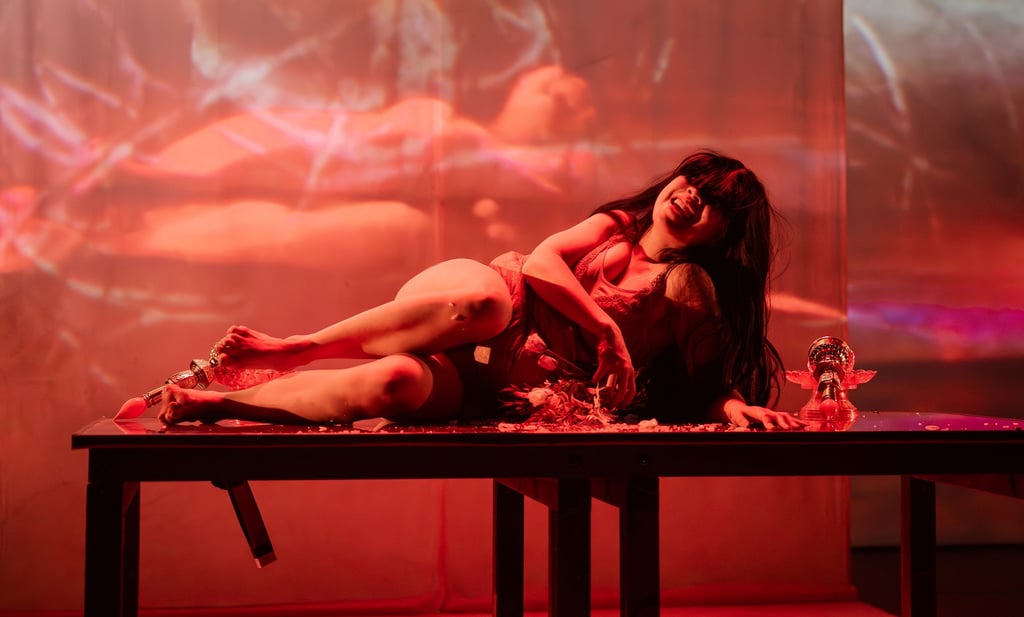REVIEW: Prayers For A Hungry Ghost – A Haunting Exploration of Family and Diasporic Burden
Review Date: 29th Oct 2025 @Barbican
REVIEWS
Kassy Fang
10/31/20253 min read


©️Elisabeth Gunawan, Photography by Ikin Yum
Elisabeth Gunawan’s Prayers For A Hungry Ghost, created by the theatre company KISS WITNESS, which she leads, draws on a haunting motif from East and Southeast Asian folklore to explore family trauma and intergenerational pressure. In Chinese mythology, “hungry ghosts” are the restless spirits of those consumed by greed, envy, or desire. With large, insatiable bellies and flames in their mouths, they eternally consume yet never satisfy themselves. Gunawan and her collaborators transpose this myth into a contemporary, diasporic context, examining the burdens faced by migrant families and the intense expectations placed on children to succeed. Seeing this piece during a Halloween weekend adds a subtle, playful resonance, though its themes are serious and poignant.
The narrative centres on twin sisters caught in the grip of a violent, controlling father and an absent mother. Both are pushed into piano practice from a young age, yet their lives diverge: the younger sister becomes a celebrated concert pianist, while the older sister struggles with a toxic relationship and a mysterious eating-related illness. Gunawan’s production transforms these personal traumas into a mesmerising physical theatre experience. The opening line, “How long have I been here?” immediately situates the audience in a liminal space, where the protagonist may be a migrant child, a haunted ghost, or both. The repetition of motifs, especially the “hungry” obsession with food, evokes the literal and metaphorical hunger of the characters, linking personal desire with inherited trauma.
As a multimedia piece, Prayers For A Hungry Ghost is visually ambitious. The production combines dance, puppetry, physical theatre, music, and subtitled videos, all devised collaboratively by Gunawan, Daniel York Loh, and Jasmine Chiu. The performers are versatile, fluidly moving between characters, instruments, and objects. Notable moments include a piano performance using only hands on a table, accompanied by projected calligraphy that shifts between crumpled, rough strokes and fluid, elegant forms. Movement direction by Matej Matejka and puppetry by Aya Nakamura further enrich the storytelling, lending moments of wit, grotesque humour, and ghostly physicality. Sound and music by Li Yilei, video and set design by Erin Guan, costumes by Ezra Barnard, and lighting by Natalia Chan complete a stage world that feels both intimate and otherworldly.
The ghostly motif is cleverly realised throughout. Scenes retell the father’s childhood, when he arrived in the United States from Hong Kong, he reportedly astonished everyone by how much he could eat. These sequences, mirrored later by the two sisters, create a grotesque, almost comical visual of excess and insatiable desire. Such imagery underscores the play’s interrogation of the “model minority” myth, exposing vulnerability, obsession, and the darker undercurrents of familial expectation.
Yet for all its ambition, the production feels raw and uneven. Some characters lack dimensionality, particularly the father, who is presented almost entirely as oppressive and unappealing. Performances occasionally stiffen, and the technical execution, including projections, dark red lighting, and video design, evokes a deliberately retro aesthetic, but at times it feels dated, reminiscent of late 1980s or early 1990s filmic stylings. Narrative threads could benefit from tightening: while motifs of consumption, music, and trauma are strong, the story occasionally meanders, leaving some emotional beats underexplored. A more focused edit could deepen the portrayal of the older sister’s unravelling and the nuanced dynamics between the twins.
In its current form, Prayers For A Hungry Ghost is an intriguing, visually inventive exploration of diaspora, trauma, and mythology. It successfully translates the haunted energy of its folkloric inspirations into contemporary performance. Though certain elements still feel unfinished or underdeveloped, with careful refinement and deeper character work, the piece could fully realise its ambitious emotional and visual potential.
★★★
For more information, please visit: https://www.barbican.org.uk/whats-on/2025/event/kiss-witnesselisabeth-gunawan-prayers-for-a-hungry-ghost
Credits
Performers/Devisers: Elisabeth Gunawan, Daniel York Loh, Jasmine Chiu
Movement Direction: Matej Matejka
Directing Team: Elisabeth Gunawan, Matej Matejka, Tang Sook Kuan
Sound and Music: LI YILEI
Video and Set Designer: Erin Guan
Puppetry: Aya Nakamura
Costume Designer: Ezra Barnard
Writer: Elisabeth Gunawan
Lighting Designer: Natalia Chan
Stage Manager and Production Manager: Hui Tse Liu
Presented by the Barbican. Commissioned by Kakilang, with support from ArtsAdmin, Barbican Open Lab and curious directive's HYPOTHESIS retreat.
Sound Behind Curtain
A place for all Asian artists.
© 2026 Sound Behind Curtain. All rights reserved.
Your gift keeps the curtain rising for Asian creatives.
About
Contact
